MercoPress. South Atlantic News Agency
Argentine hopes dashed on Falklands, Antarctica: Continental Shelf Commission refused to consider three major claims
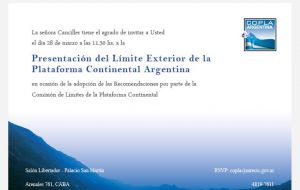 The Commission is composed of 21 scientists and its Rules of Procedure forbid consideration of “unresolved land or maritime disputes”.
The Commission is composed of 21 scientists and its Rules of Procedure forbid consideration of “unresolved land or maritime disputes”. 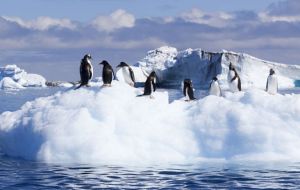 As Willetts puts it, “Antarctica has become a global science observatory and wildlife reserve, subject to no government’s sovereignty and accessible to all”.
As Willetts puts it, “Antarctica has become a global science observatory and wildlife reserve, subject to no government’s sovereignty and accessible to all”. 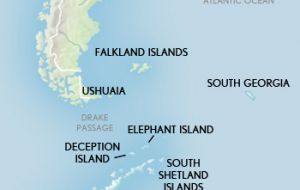 Britain, the United States and Russia all tabled strongly-worded diplomatic notes protesting against Argentina's challenge to the special status of Antarctica.
Britain, the United States and Russia all tabled strongly-worded diplomatic notes protesting against Argentina's challenge to the special status of Antarctica. 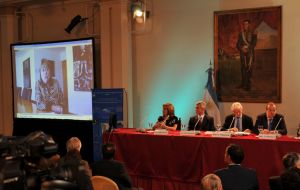 When Argentina on March 28 made the official shelf extension announcement, minister Malcorra was overseas and sent a very carefully worded video
When Argentina on March 28 made the official shelf extension announcement, minister Malcorra was overseas and sent a very carefully worded video 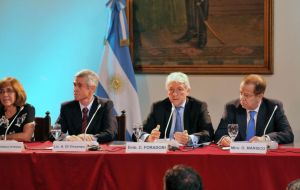 The March 28 event at Palacio San Martín with a great media and political coverage was headed by Deputy minister Carlos Foradori
The March 28 event at Palacio San Martín with a great media and political coverage was headed by Deputy minister Carlos Foradori In April 2009, Argentina submitted a formal claim to sovereignty over an exceptionally large continental shelf, across hundreds of miles of the sea-bed to the east and south of Argentina. This year, in March, newspapers around the world incorrectly reported the whole Argentine submission had been endorsed.
When the Commission on the Limits of the Continental Shelf (CLCS) made public its legally binding “Summary of Recommendations”, on 23 May, it was revealed that they had refused to consider Argentina’s claim to three major areas.
A London-based think tank, the South Atlantic Council, has released a new Occasional Paper, by Professor Peter Willetts, on the CLCS handling of the Argentine submission. The detailed study demonstrates that all the precedents in the Commission’s previous work meant there never was any possibility of complete success for Argentina. Willetts said, “I was surprised by the news stories this March and, the more I looked into the question, the more baffled I became”. The Commission is composed of 21 scientists and its Rules of Procedure forbid consideration of “unresolved land or maritime disputes”.
The CLCS recommendations do not discuss the sea-bed around two British Overseas Territories in the South Atlantic – the Falkland Islands, and South Georgia and the South Sandwich Islands. The Commission refused to examine the Argentine scientific data on these areas, because they are disputed territories. Argentina should have expected this outcome, because in April 2010 the Commission had, for the same reason, refused to consider a similar British submission covering the same two areas.
The third area, the seas around Argentina’s claim to territory in Antarctica, was not considered for a different reason. Under the Antarctic Treaty, to which both Britain and Argentina are parties, all questions of sovereignty are suspended. Before the Argentine delegation to the Commission in New York had even made its oral presentation, Britain, the United States and Russia had all tabled strongly-worded diplomatic notes protesting against this challenge to the special status of Antarctica.
As Willetts puts it, “Antarctica has become a global science observatory and wildlife reserve, subject to no government’s sovereignty and accessible to all”.
Willetts concludes by suggesting “the Commission could endorse a joint submission, if the governments of Argentina and the UK were willing to agree pragmatic arrangements to share the resources”.
The views expressed in South Atlantic Council Occasional Papers are those of the author and are not necessarily shared by all members of the Council. The paper may be freely copied and printed, in whole or in part, for any non-commercial purposes, provided that any quotations are made without any amendments and that both the author and the SAC are cited.
The South Atlantic Council was formed in December 1983, in the aftermath of the Falklands/Malvinas conflict, with the aim of improving relations between Britain, Argentina and the Islanders.
Its membership is composed of up to fifty UK citizens, drawn from parliament, academia, business, the media, the law, diplomacy and the churches.
The Council
• seeks to influence policy-makers and opinion leaders, and to stimulate informed public debate;
• has contributed to the restoration of diplomatic relations and contact within civil society, through the holding of a series of Argentine-British Conferences;
• has published a series of Occasional Papers to provide background political analysis and to generate discussion about options for the future of the Islands; and
• has facilitated discussion, both at the Council's own meetings and at other events, among politicians and officials from Argentina, Britain and the Islands.
The Council is independent and does not collectively take a position on what settlement to the dispute should be adopted, except that it should be acceptable to the three parties.
Publication Details
Delimitation of the Argentine Continental Shelf, (South Atlantic Council Occasional Paper, No. 14) by Peter Willetts, Emeritus Professor of Global Politics, City University, London, published on the SAC website, at
www.staff.city.ac.uk/p.willetts/SAC/OP/OCCPAP14.HTM and www.staff.city.ac.uk/p.willetts/SAC/OP/OCCPAP14.PDF
About the South Atlantic Council, from the SAC’s website home page, at www.staff.city.ac.uk/p.willetts/SAC/INDEX.HTM




Top Comments
Disclaimer & comment rules-

-

-

Read all commentsHA Ha ha,
Jun 03rd, 2016 - 08:11 pm 0Soddy Offy you greedy deluded crooks.
Such foolish people. But then they are Argentine
Jun 03rd, 2016 - 08:57 pm 02 There were also another big bunch of thick fools- All the UK Daily Papers- BBC -ITN - etc who all fell for the Argie press release, believed it hook line and sinker - and then ended up with egg all over their faces - did any one of them apologise to their readers and viewers??? - No!
Jun 03rd, 2016 - 09:11 pm 0Commenting for this story is now closed.
If you have a Facebook account, become a fan and comment on our Facebook Page!